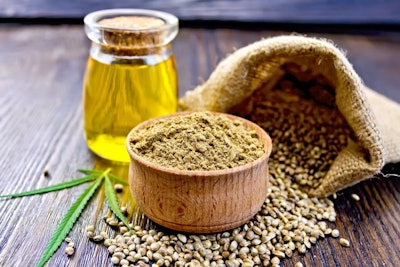
Considering the numerous articles of late appearing in the veterinary, consumer and trade press, as well as the open availability of products in retail outlets and online, one could easily surmise that CBD (cannabidiol) and other hemp-derived ingredients are perfectly acceptable in pet foods and treats in the US. I receive inquiries on a weekly basis from current or prospective clients wishing to enter this market. However, in light of information provided at a recent webinar, as well as an even more recent announcement of enforcement actions taken by the Food and Drug Administration (FDA), this presumption of acceptability is premature.
The American Pet Products Association (APPA) hosted a webinar in mid-November 2019 entitled “CBD and Pet Products: Regulatory Update”. Presenters (in addition to myself) were Bill Bookout, president of the National Animal Supplement Council (NASC), and John Fuson of the law firm Crowell & Moring. Bottom line, the webinar posed this question: Is CBD allowed in pet foods/treats? The short answer is no.
CBD does not meet any regulatory criteria for pet foods
Under federal law, all ingredients in a food (which includes all form of animal feed) must be approved by FDA as a food additive unless it is generally recognized as safe (GRAS) for its intended use. That would include many items that are not expressly GRAS but are universally understood to be foods. For animal feeds, there is an additional albeit informal means of establishing acceptability through the Association of American Feed Control Officials (AAFCO) Feed ingredient Definition process.
Simply put, CBD does not meet any of the above criteria. Thus, a pet food containing an unapproved food additive such as CBD would be subject to enforcement action as an adulterated food (or, depending on associated claims, an adulterated drug). There may be some hemp-derived ingredients already in the regulatory pipeline (e.g., via an AAFCO definition or GRAS notification), so something like hemp oil or meal may be available for inclusion in pet products soon. There are similar ingredients already allowed for use in foods for human consumption. Importantly, though, none of the proposed animal feed ingredients are anticipated to contain appreciable levels of CBD.
What about the 2018 US Farm Bill; didn't that legalize CBD? Not totally. As discussed in detail in the February 2019 issue of Petfood Industry, what the amendment to the Controlled Substances Act did is to remove the Drug Enforcement Administration’s authority to regulate hemp and its derivatives as Schedule 1 drugs, provided that the material contains less than 0.3% THC (9-tetrahydrocannabinol). At first blush, that would appear to exclude CBD from regulatory oversight. However, that change in the law does not impact the Federal Food, Drug and Cosmetic Act as enforced by FDA, nor the equivalent laws as enforced by state feed control officials. On the contrary, these agencies can still impose the same requirements on hemp as they do for any other feed ingredient. In fact, to circumvent that process would be patently unfair to those manufacturers of other ingredients that followed the rules.
Approach to enforcement against CBD may be changing
Why are there so many products on the market that appear to contradict the above? That's a great question! Certainly, FDA and AAFCO have not been shy in publicly stating that CBD is not an acceptable feed ingredient, so the lack of evidence of meaningful enforcement to back up that position is perplexing. Briefly, notwithstanding what the regulators say, what their internal enforcement priorities are is a different matter. A lack of willingness to act against violative products due to political or other considerations may be part of it.
Regardless, that relatively tepid approach to enforcement may be changing. In a late-November news release, FDA announced that it issued 15 warning letters to companies distributing CBD products. These included manufacturers of pet treats and other animal feed products. Many of FDA’s objections were related to claims made for the product, i.e., indications to treat, prevent, mitigate or otherwise affect a disease or condition without prior approval as a drug for those intended uses. However, FDA’s unease went well beyond mere labeling matters, expressing significant safety concerns with any inclusion of CBD irrespective of claims.
No safe regulatory harbor at this time
In short, at this time there is no safe regulatory harbor for distributors of pet foods, treats or other articles subject to regulation as animal feeds to include CBD in their products. Therefore, for those wishing to market CBD-containing pet products, other means of distribution would appear to be a more prudent tack. It is obvious that the regulatory landscape remains rocky regardless, but labeling a product so that it is “not a food” (e.g., a “dosage form animal health product” as per NASC guidance) may be a less risky option. Limiting claims to exclude any expressed or implied drug claims would likely help mitigate (though not wholly negate) the risk of enforcement action.
Briefly: Top 5 takeaways
- A presumption that CBD usage in pet foods or treats is acceptable based on media attention or products on the market is premature.
- Under federal and state law, CBD currently does not meet any criteria for legal use as an ingredient in a pet food or treat.
- The 2018 Farm Bill, which amended the Controlled Substances Act to exempt hemp, does not impact the Federal Food, Drug and Cosmetic Act as enforced by FDA.
- The same is true for equivalent state laws enforced by state feed control officials.
- In late November, FDA sent warning letters to companies distributing CBD products, including some pet food manufacturers.
















